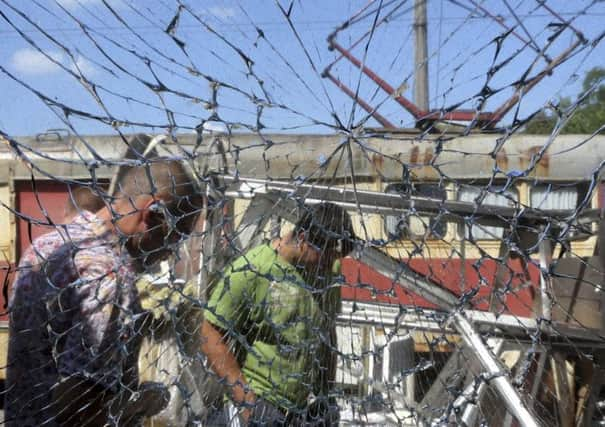20,000 Russian troops mass on Ukraine border


Stating the conflict was fuelled by Russia, Nato yesterday said the troop build-up escalated “a dangerous situation”.
Spokeswoman Oana Lungescu said: “We’re not going to guess what’s on Russia’s mind, but we can see what Russia is doing on the ground – and that is of great concern.”
Advertisement
Hide AdAdvertisement
Hide AdThe military alliance is concerned Moscow could use “the pretext of a humanitarian or peace-keeping mission as an excuse to send troops into eastern Ukraine”, she said.
The Nato warning came after senior United Nations officials told the Security Council at an emergency meeting on Tuesday night that the humanitarian situation in the east was steadily worsening as power and water supplies became scarce, homes were destroyed and health workers fled.
The European Union and the United States last week agreed tough new sanctions against Russia over its actions in Ukraine, marking a new phase in the biggest confrontation between Moscow and the West since the Cold War. The conflict worsened dramatically after the downing of Malaysia Airlines flight MH17 – with the loss of 298 lives – over rebel-held territory on 17 July by what western countries claim was a Russian missile. And last night Russia said will impose “quite substantial” bans on US and EU food imports and has already decided to suspend US poultry imports.
President Vladimir Putin yesterday signed a decree banning or limiting imports of agricultural products from countries which have imposed sanctions on Russia because of its support of rebels in Ukraine.
He ordered his government to come up with a list of goods to be banned for imports into Russia and to last one year, the Kremlin said.
Russia imported $43 billion worth of food last year.
The roughly 20,000-strong troop presence included tanks, infantry, artillery and air defence systems, one Nato officer said, speaking on condition of anonymity. Russia has used military exercises as cover for intervention in the past, military analysts say, including when it stormed into pro-western Georgia in 2008 under the pretence of safeguarding Russian speakers, sparking a war in which about 1,000 soldiers and civilians were killed.
On Tuesday night, John Ging, director of UN humanitarian operations, told the Security Council in New York said that violence, especially in urban areas, will put more people at risk and lead to “an increase in the numbers killed” if a political solution cannot be reached. “Immediate action is therefore required to prevent this,” said Mr Ging, a former officer in the Irish army and a security expert.
The meeting, requested by Russia, comes after fighting in eastern Ukraine reached the rebel stronghold of Donetsk. Pro-Russia separatists and government troops on Tuesday exchanged rocket fire in the latest clashes since the two sides began battling in April.
Advertisement
Hide AdAdvertisement
Hide AdUkraine’s deputy ambassador Oleksandr Pavlichenko denied there was a humanitarian crisis but said the situation in Donetsk and Luhansk was still serious. “The situation is manageable by the government of Ukraine, which remains open to co-operation with international partners,” he said.
Mr Ging had said nearly four million people living in the region were affected by violence. Water and power supplies have sustained significant damage. In Donetsk and Luhansk, the water supply has been cut to a few hours each day, health supplies are running low and an estimated 70 per cent of health personnel have fled, he said. Just over 4,000 people have been wounded in eastern Ukraine since April. About 58,000 people have left since early July, and more than 1,000 others are fleeing each day, Mr Ging said.
US deputy ambassador Rosemary DiCarlo questioned whether the humanitarian situation in Ukraine merited an emergency meeting, a view echoed by Rwanda.
Britain’s UN ambassador Mark Lyall Grant said: “It is deeply ironic that Russia should call for an emergency meeting of the council to discuss a humanitarian crisis largely of its own creation.”